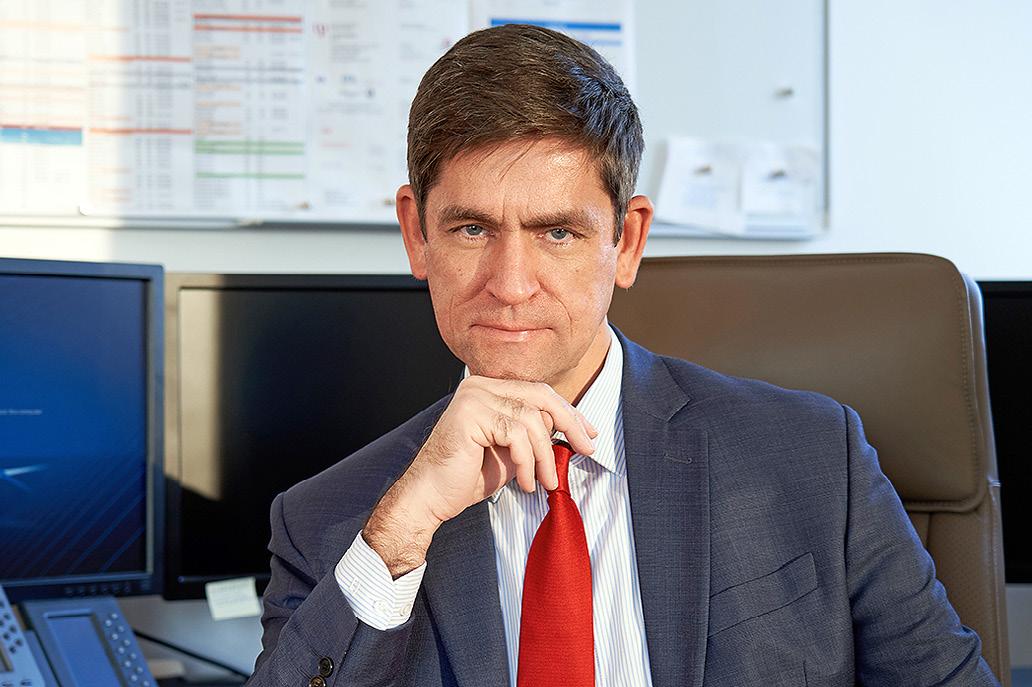
6 minute read
Péter Lakatos
BACKGROUND Péter Lakatos, managing partner of leading law firm Lakatos, Köves and Partners (LKT), is a tough lawyer and trouble-shooter in court cases and negotiations and a leading expert of the Hungarian telecommunications, media and technology sectors. He has played a leading role in the development of the Hungarian TMT sector and also helped to create the telecoms legal framework in several southeastern European countries. Recently, Lakatos advised Vodafone on its UPC cable business acquisition and Rosatom on its involvement in the Paks NPP, and advised PE fund MidEuropa and logistics company Waberer’s on its IPO. He is ranked as a leading lawyer in Hungary by Chambers, IFLR and Legal 500.
He is also a proud father of three children and can also be heard and seen at lawyers’ galas and balls as a pianist in the Sentiments Piano Duo, where he plays together with his musician wife, Éva Molitor.
OF WHICH ACHIEVEMENTS YOU ARE MOST PROUD? Obviously, my three healthy and smart children are the biggest achievements in my life. However, I can’t complain regarding my professional life either, because I had – and have –achievements there as well.
For example being a partner of Clifford Chance for more than 10 years is something I am proud of. Being part of what was, at the time, the largest law firm in the world meant being part of the legal elite of the world and being treated as an equal to partners in London, New York or Hong Kong. Since our spin-off from Clifford Chance in 2009, with my partners and many other colleagues (currently around 65), we have with hard work and commitment been building Lakatos, Köves and Partners as an independent, internationally focused law firm to serve our clients. Today LKT is a well-known brand, recognized and trusted by many big international law firms and multinational companies. I am very proud when I see our name on matters and rankings alongside other big brand name advisors, whether law firms, investment banks, or auditors.
WHAT DREW YOU TO LAW AS A PROFESSION? My grandfather was an attorney-at-law with a traditional practice in a small town in Hungary. He graduated just after World War I and actually finished his legal practice in the late 1980s. He had seen a lot of life and history. Once he stated that he had met with more than 30,000 people during his almost six decades of practice. He told me his big stories at courts and with other famous negotiators. My father, who was not a lawyer but a language teacher, always taught me to think,
and to do it critically; a basic principle which I try to teach my children. So their influence was clearly a decisive factor which drew me to law as a profession. I also need to mention the civil law Professor Vékás from the law school, whose intellectual approach and very high level of professionalism clearly enhanced my motivation and desire to become a practicing lawyer who deals with complex problems.
I am generally considered to be a problem solver but also a litigator if the case requires it. So, when an interesting issue comes up, whether it is one which requires working out alternative legal strategies and where a deal can be negotiated and finally agreed, guaranteed and implemented with legal means, or my client’s legal position has to be represented, protected and enforced at court, that is the intellectual challenge which I like most in my profession.
58
Name of law firm Lakatos, Köves & Partners Law Firm
Name of associate non-Hungarian law firm or cooperation network Clifford Chance LLP, Multilaw, Interlaw, Association of European Lawyers, Global Leaders Forum
Address 1075 Budapest, Madách Imre út 14.
Managing partner Péter Lakatos
In charge of position since 2006
Year of Hungarian law firm's establishment 1991
No. of attorneys with license to practise in Hungary on Sept. 15, 2020 37
No. of partners of Hungarian law firm on Sept. 15, 2020 9
HOW DID YOU PICK YOUR LEGAL SPECIALTY AREA? It was clear from the very beginning that I was interested in the civil law area in the broader sense. In the ’80s, when I was at law school in Budapest, the borders were closed. We were allowed to travel to Western Europe just once in every third year. We all wanted to find a way to travel, and were very interested in anything which had some international element and that led my attention towards cross-border legal matters. I started to work with Péter Köves, in the law firm he had just established soon after the political changes in Hungary and after my graduation as an LL.M student in Washington DC. As the borders opened up and the huge transition started from a socialist economy and legal system to a market economy and legal system, I was part of the legal advisory team advising one of the international consortia bidding for the new GSM license. That was my first telecom project, which led to many others over the years. I like modern technology in general, therefore I found and felt at home in my specialty area in this way. Most of the international telecom and technology companies which have ever came to this country became our client at some point in the last three decades, such as France Telecom, British Telecom, Deutsche Telekom, Cable and Wireless, Mannesmann, Vivendi, Alcatel, UPC, TDF, Antenna Hungária, HTCC, Teledenmark International, Invitel, Digi, Nokia, LG, Vodafone etc. There is no legal area on which we haven’t advised such clients over the decades. We have handled a wide range of complicated issues with regulatory, M&A, labor, tax and litigation aspects.
In addition to telecom matters, I also advice clients on other complicated matters, whether it is multibillion euro EPC [engineering procurement construction] contract-related issues, or high profile accident-related legal matters. Always providing the intellectual challenge, which I am looking for. WHAT WOULD YOU CHANGE TO IMPROVE THE LEGAL ENVIRONMENT IN HUNGARY? Clearly, the Hungarian legal system went through major changes in the last three decades. I remember the funny situations, for example in a case when I had to explain to a countryside judge what subcontracting means. Luckily, we are now very far from those days. The recent changes in most of the civil and procedural laws and regulations created new challenges in this decade, and the whole legal profession needs to work hard to develop an amicable and fair practice in their implementation. The concept of “digital lawyer and legal practice” has also developed rapidly in recent years, which itself requires a huge transition of the profession and the legal environment.
However, we should never forget the basic values attached to a democratic society, our profession, our professional conduct and integrity during our life and day-to-day operation and, therefore, the right focus, the proper education for the younger generations, training practicing lawyers and inculcating such values in their practice could greatly improve the quality of the legal environment in the middle and long run.











